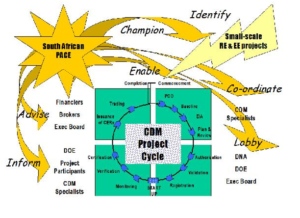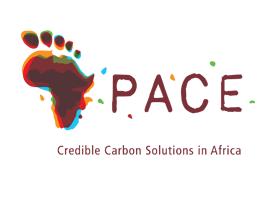“Promoting Access to Carbon Equity” (PACE): in 2004, Parallax was funded by the UK Foreign and Commonwealth Office to work with EcoSecurities, the world’s leading broker of carbon credits, to establish a national PACE Centre for small scale CDM projects in Southern Africa. This Centre, aiming to facilitate increased carbon financing in Africa, was launched in November 2005. Through its Global Opportunities Fund, the UK Government continued to support Parallax directly for the operation of the PACE Centre. The Department of Minerals and Energy (DME) of South Africa also endorsed the operation of PACE. From March 2007, the PACE Centre became self-sustainable, operating without any external subsidy. It continues today to consider the whole range of renewable energy and energy efficiency projects that can benefit from credible carbon savings. See PACE website here
PACE
The PACE Centre was originally a project managed by Parallax. PACE is now an independent, not-for-profit organization with it’s own website. Please go to the new PACE website for the latest news from The PACE Centre.
The establishment of the PACE Centre in South Africa is the first step in forming a global network of centres that aim to support the Clean Development Mechanism (CDM). Following the World Summit for Sustainable Development (WSSD) in Johannesburg in 2002, the UK Government recognized that small-scale CDM projects offer an ideal opportunity to fulfill environmental and development goals. In 2004, ahead of the UK’s Presidency of the European Union with a focus on Africa and climate change, the UK Foreign & Commonwealth Office (UKFCO) funded an initiative to facilitate this process as part of its Global Opportunities Fund. UKFCO commissioned EcoSecurities and Ecofys to undertake pilot projects in South Africa and India to demonstrate the value of national centres for small-scale CDM projects focused on renewable energy and energy efficiency.
Parallax, in partnership with its associate Anton Cartwright, was selected as the local partner for South Africa and given the task of establishing the PACE Centre. This process must be driven by local stakeholders, with extensive local consultation, to establish the needs that might be addressed by PACE. EcoSecurities is an internationally well-recognized consultancy firm active in climate change, renewable energy and energy efficiency, and so is able to offer useful support to Parallax with the provision of international expertise that may be adapted to the needs identified in South Africa. With this resource, and funding from UKFCO, Parallax is now engaged in establishing the PACE Centre for South Africa.
Promoting Access to Carbon Equity (PACE) Centre
Background
The Kyoto Protocol has conceived the Clean Development Mechanism (CDM), as a means of assisting industrialized countries to meet their legally binding emission reduction targets. By funding activities in developing countries that reduce the atmospheric concentration of greenhouse gases, industrialized countries are able to reduce the cost of complying with their Kyoto obligations and promote sustainable development. South Africa, with a high emissions intensity compared to other major developing countries, is well placed to profit from investments and technology transfer under the CDM. The challenge is now to maximize the value of this opportunity.
The PACE Centre
The ratification and implementation of the Kyoto Protocol in 2005 represents a unique accord for the commitment of multi-lateral resources to climate change mitigation. In this context, the UK Government is financing the creation of a South African centre to support and accelerate the implementation of small-scale CDM projects that involve renewable energy and energy efficient technologies. This effort is intended to initiate a global network of CDM centres, enabling South Africa to be the first to benefit from evolving best practice, international information exchange, knowledge dissemination and the practical implementation of CDM projects.
The main goal of this initiative is to enable small-scale renewable energy and energy efficiency projects to access certified carbon credits on an equal footing to their larger-scale counterparts: Promoting Access to Carbon Equity (PACE) is therefore the focus of the centre in South Africa.
The project team will analyze the current needs with respect to small-scale CDM implementation and will identify the potential scope of the PACE Centre in South Africa.
Activities and issues that the PACE Centre will seek to address include:
- Promoting CDM investments, raising awareness of CDM potential among small & medium sized businesses and local government, and highlighting the potential linkages between CDM opportunities and local economic development
- Facilitating effective interactions between all CDM stakeholders, including close collaboration with the DNA of South Africa to ensure effective co-ordination
- The need to lower CDM transaction costs confronted by small-scale CDM projects
- Project bundling and project design document (PDD) services for small-scale renewable energy and energy efficiency projects
- Cost-benefits of establishing a national Designated Operating Entity (DOE)
- The development and availability of renewable energy and energy efficiency baseline methodologies to local stakeholders in relevant sectors
By creating an enabling environment for small-scale CDM project implementation in the field of renewable energy and energy efficiency, the PACE Centre will seek to remove some of the barriers that are currently restricting such activity in South Africa.
In its formation period the PACE Centre’s work will involve five phases:
Phase 1: To prepare a business concept for PACE in consultation with all relevant stakeholders
Phase 2: To operate PACE during its formation (until November 2005), including:
- Identifying barriers and solutions
- Identifying best practice
- Identifying opportunities in SA
- Identifying existing potential CDM projects for small-scale RE & EE
- Assessing the viability of PACE in the longer-term (being dependent upon the viability of small-scale CDM projects in South Africa)
Results will allow the PACE business concept to be assessed and modified so as to best meet the needs of stakeholders
Phase 3: To evaluate the merits of continuing the PACE Centre’s operations beyond the duration of this project. If it becomes clear that the PACE centre should not continue beyond the initial year, an exit strategy will be prepared and undertaken to ensure that maximum value from the PACE experience is delivered to stakeholders.
Phase 4: Assuming that there is a robust case for continuing the PACE Centre’s activities, to develop an international network that will allow information exchange.
Phase 5: To formally launch the PACE Centre in November 2005 and, providing that adequate revenue streams have been secured, to continue its operation.

The PACE Centre will be a facilitator of CDM activities. The Centre will neither trade nor bank Certified Emissions Reductions and will not act as the agent of any investor. Extensive consultation with relevant stakeholders is fundamental to the Centre’s activities. To ensure the sustainability of the PACE Centre beyond its first year, the project team is already discussing financing options with the public and private sector.
The process required to establish the PACE Centre was set out in broad terms of reference for UKFCO. Some of the key features of PACE are as follows:
- The PACE Centre should remain neutral within the CDM market
- PACE is not intended to house CDM specialists, but provide access to existing resources
- PACE does not have an interest in providing CDM services or trading emissions reduction credits
- The PACE Centre will not manage CDM projects, but will seek to facilitate project development
- The PACE Centre will be a conduit for CDM service-providers
- PACE will work to expand the small-scale CDM market in South Africa, bringing opportunities for all stakeholders
- The PACE Centre will seek to release the potential contained in the Local Economic Development (LED) / CDM overlap
- PACE will bring together small-scale CDM project implementors with appropriate CDM developers and investors
In May 2005, workshops were held in Midrand (17 May), Cape Town (18 May) and Durban (19 May) for direct consultation with stakeholders. Invites were sent to selected organizations that may benefit from the Clean Development Mechanism in identified target areas.
These workshops were intended to provide information about CDM options for small-scale project developers, Government officials, and potential investors. Participants also helped determine how best to position the national PACE Centre to provide the necessary support for such renewable energy and energy efficiency projects. This input from stakeholders helped to decide how the PACE Centre would operate in the future, meeting the identified needs.
Only a small number of people were invited to attend each of these workshops to ensure that the discussions were focused on the practical implementation of small-scale CDM projects, enabling PACE to determine how best to offer appropriate support. The involvement of participants with energy efficiency and/or renewable energy work meant that they were in a strong position to benefit from the support that may be offered by CDM.
The workshops provided an opportunity for stakeholders to hear about and debate the prospects for financing clean energy projects from the Clean Development Mechanism. The aim of the workshops was to determine how to access this financing and how the newly-formed national PACE Centre can support the attempts of participants to develop and validate small-scale CDM projects.
